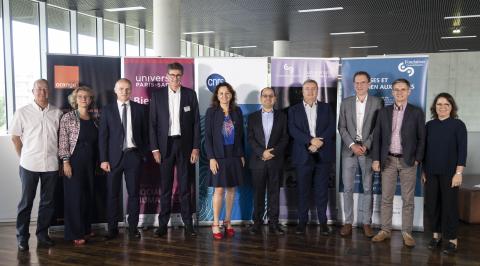
Networks of the future: Université Paris-Saclay, the CNRS, CentraleSupélec and Orange come together to create a Research Chair for Sustainable 6G
Orange, Université Paris-Saclay, the French National Centre for Scientific Research (CNRS) and CentraleSupélec have signed a partnership agreement aimed at boosting innovation and academic research in the design and management of sustainable and energy-efficient 6G networks.
The signing of this major strategic partnership on Wednesday 13 September entails the launch of a research chair dedicated to sustainable 6G networks, coordinated by the Signals and Systems Laboratory (L2S - Université Paris-Saclay, CNRS, CentraleSupélec), and with the support of the CentraleSupélec Foundation.
The Sustainable 6G chair will call on the scientific expertise of the L2S laboratory, which combines the basic and applied mathematical aspects of control theory with information and communication theory. The academic diversity of this expertise will allow for ambitious research work to be carried out, in order to:
- create a framework for the coordination of smart networks, combining distributed and centralised mechanisms, for a resilient and energy-efficient network which is dynamically optimised on different timescales, depending on the needs of society and operational constraints
- establish paradigms for the allocation of highly-distributed resources, including for communications, computing and energy
- develop cutting-edge technologies for the design of the physical aspects: flexible, high spectral efficiency, with low energy consumption.
Bruno Zerbib, Chief Technology & Innovation Officer at Orange said, “We think that 6G should enable the creation of valuable services for society, which tackle societal and environmental challenges in particular, whilst remaining sustainable environmentally, socially and economically. We are delighted to partner with CentraleSupélec to create a top-level academic centre dedicated to the development of mathematical tools and skills which will help us meet these objectives.”
Pascal Bondon, Director of the Signals and Systems Laboratory (L2S) explained that, “6G is a strategic field of research for L2S, and we hope to become an international reference for the design of these networks for the future. This research chair will allow L2S to play a key role in the development of an academic and industrial consensus on 6G as an energy-saving network which has a role to play in sustainable industrialisation.”
